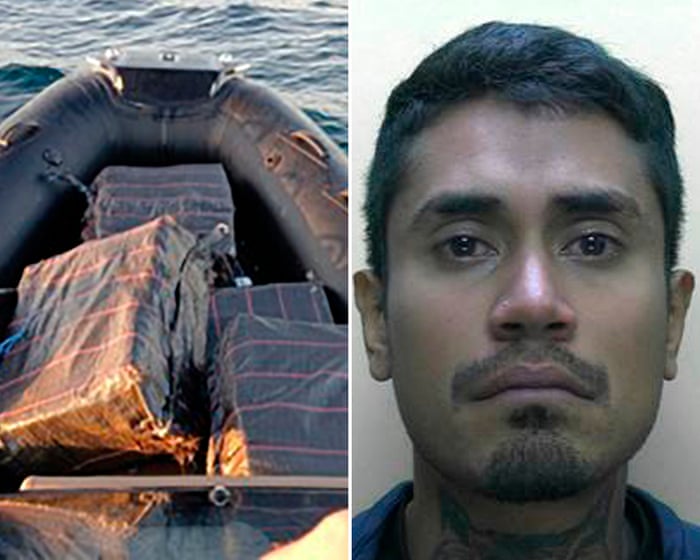To the surfers and dog walkers on the Cornish beach, it must have looked like something straight out of a crime thriller. A dramatic ocean chase ended with two boats crashing onto the sand, three men stumbling as they tried to flee into the dunes, followed by arrests and the discovery of millions of pounds worth of cocaine.
For investigators, this marked the beginning of a meticulous probe into a smuggling tactic used by South American drug cartels and British organized crime groups. Known as “at-sea drop-offs” (Asdos), the method involves dumping GPS-tracked cocaine bales from transatlantic “mother ships” into the ocean, where smaller boats retrieve them and smuggle the drugs into the UK through secluded coves and harbors.
What made Operation Libellary especially rewarding for investigators was that they captured individuals involved in multiple aspects of the operation. Among them were a struggling Hampshire fisherman recruited for his seafaring skills, a Colombian enforcer ensuring the pickup went smoothly, and members of an “Essex crime group” believed to have purchased the shipment for distribution in southeast England.
Barry Vinall of the National Crime Agency (NCA), the senior investigating officer, said the seven men convicted of conspiring to import Class A drugs were key players. “You had organizers, logistics, security, and buyers,” he explained.
The case began with a stroke of luck for law enforcement. On September 13 last year, the UK Border Force cutter HMC Valiant was patrolling off Cornwall when officers spotted a rigid-hulled inflatable boat (RHIB) on the horizon. Aware of a “mother ship” in the area, they moved to investigate—prompting the RHIB to speed away.
For 28 miles, the three men aboard the RHIB stayed ahead of the Border Force vessel, tossing packages of cocaine overboard. The chase ended on Gwynver Beach near Land’s End, where Peter Williams, 44, Scott Johnston, 38, and Edwin Yahir Tabora Baca, 33, were arrested. A Garmin chart plotter and knives were found, along with 11 dumped cocaine bales—six of which were recovered, worth around £18 million.
An NCA team rushed from London to Cornwall. “We moved fast,” Vinall said. “It was all hands on deck to gather as much information as possible about their activities and identities.”
Investigators learned that Williams was a fisherman by trade, well-known in Emsworth Harbour, Hampshire, where he ran a business called Fresh from the Boat, supplying seafood to hotels and pubs. Despite winning small business awards, Williams had faced tough times—his boat, Tia Maria, was destroyed in Storm Eunice in 2022. Locals rallied to help him buy a new boat, Brenda C, but financial struggles persisted.
CCTV from the harbor revealed suspicious meetings between Williams and others, leading investigators to uncover a wider network.
Tabora Baca, from Barcelona, initially claimed he was a tourist who had accepted a fishing trip with strangers. But his phone told a different story.Investigators uncovered messages from his boss instructing him to join Williams and Johnston, another man from Hampshire, on a boat trip to retrieve cocaine packages dropped by a passing ship.
Vinall explained: “These ships pass through and dump large quantities of drugs, then multiple organized crime groups rush in—like seagulls following a fishing trawler—to collect them.” Tabora Baca was believed to be acting as security, possibly for a cartel, ensuring each group took only their allotted share.
Meanwhile, the National Crime Agency (NCA) turned its attention to three men from Essex—Bobbie Pearce, 29, Michael May, 47, and Terry Willis, 44—who were traveling to Cornwall in a hired white van as the speedboat raced out to collect the drugs. The NCA suspects these men were responsible for transporting the cocaine back to eastern England for distribution in Essex and London.
When authorities spotted the speedboat and gave chase, Johnston called Willis from the vessel—likely warning him the operation had failed—before throwing his phone overboard. The three Essex men quickly fled the area in their van and a BMW.
A crucial lead came from a sticker on the speedboat linking it to a marine company in North Wales. The NCA traced the purchase to Alex Fowlie, 35, from West Sussex, who had bought the boat for £70,000 months earlier. Fowlie, the seventh man involved, played a central role in facilitating the operation.
Confident he wouldn’t be caught, Fowlie was on a short holiday with his partner in Newquay, a surfing town in North Cornwall, while the drug pickup was underway. “It was an odd choice, given the circumstances,” Vinall remarked. “But he was posting photos on Facebook the whole time.”
Losing drugs and smugglers is part of the risk in this trade. Three days after the Gwynver Beach chase—when Fowlie assumed he was in the clear—he was already organizing another pickup.
“We can get a team ready,” he messaged an accomplice, unaware the NCA was monitoring him. “We just need a fisherman and one of us to go out with him, plus one of their guys to oversee things. You’ve got radar—if you see anything suspicious, just drop the package back in. It has GPS, so we can retrieve it later with the speedboats. Zero fucking risk.”
Not quite. On August 1, Tabora Baca, Johnston, Willis, and May received lengthy prison sentences for conspiracy to import Class A drugs. The remaining defendants are scheduled for sentencing on August 21.



